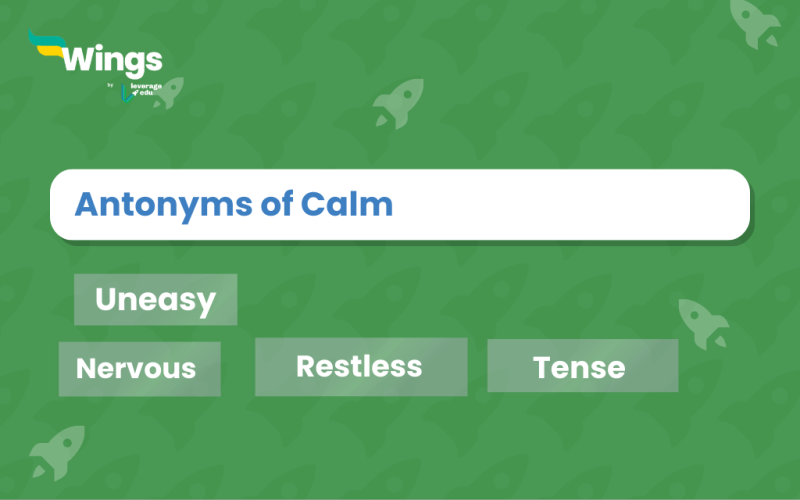A few common antonyms of “calm” are agitated, restless, chaotic, anxious etc. The word “calm” can be described as a state of easiness and comfort. To learn more about the antonyms of calm and its meaning, you can refer to the blog article below!
This Blog Includes:
Meaning of Calm
“Calm” is an adjective that describes a state of peace, tranquillity, and serenity. When something or someone is calm, it means that there is a lack of disturbance, agitation, or turbulence. Calmness can refer to both external environments and internal emotional states.
Also Read: 7+ Antonyms of Large with Meaning and Examples
15+ Antonyms of Calm
A few common antonyms of “calm” are listed below for your reference:
- Agitated
- Restless
- Turbulent
- Chaotic
- Disturbed
- Hectic
- Anxious
- Nervous
- Tense
- Unsettled
- Frantic
- Violent
- Stormy
- Frenzied
- Upset
- Disordered
- Ruffled
- Excitable
- Distressed
- Aggravated
Usage with Examples
Here are some examples of antonyms of “calm” mentioned below for your reference.
- The agitated crowd protested loudly outside the government building.
- The airplane experienced turbulent conditions during the storm, causing some passengers to become frightened.
- After drinking too much coffee, she felt restless and couldn’t sit still.
- The scene in the city center was chaotic as protestors clashed with the police.
- Her hectic work schedule left her with little time for relaxation or leisure activities.
- She felt anxious about the upcoming job interview and couldn’t sleep the night before.
Also Read: 7+ Antonyms of Practical with Meaning and Examples
Antonyms of Calm Quiz
Instructions: Choose the correct antonym for the word “Calm” in each question.
01. Which of the following is the best antonym for “Calm”?
a) Peaceful
b) Tranquil
c) Agitated
d) Serene
Answer: c) Agitated
02. Which word is the opposite of “Calm” in terms of emotions?
a) Disturbed
b) Relaxed
c) Quiet
d) Collected
Answer: a) Disturbed
03. If someone is not calm, they are likely to be ____.
a) Restful
b) Anxious
c) Composed
d) Serene
Answer: b) Anxious
04. What is the antonym of “Calm” in the context of behavior?
a) Nervous
b) Placid
c) Mild
d) Peaceful
Answer: a) Nervous
05. A situation that is not calm can be described as ____.
a) Chaotic
b) Harmonious
c) Still
d) Quiet
Answer: a) Chaotic
06. Which word does NOT mean the opposite of “Calm”?
a) Excitable
b) Hysterical
c) Serene
d) Turbulent
Answer: c) Serene
07. A person who is the opposite of calm might feel ____.
a) Relaxed
b) Tense
c) Content
d) Settled
Answer: b) Tense
08. What is an antonym of “Calm” when describing the ocean?
a) Stormy
b) Smooth
c) Tranquil
d) Still
Answer: a) Stormy
09. If a crowd is not calm, it can be described as ____.
a) Boisterous
b) Gentle
c) Quiet
d) Serene
Answer: a) Boisterous
10. The opposite of a calm reaction is ____.
a) Panicked
b) Composed
c) Relaxed
d) Gentle
Answer: a) Panicked
Also Read: Antonyms of Fear
Check antonyms of other words here:
| Antonyms of Simple | Antonyms of Whole |
| Antonyms of Similar | Antonyms of Hard |
| Antonyms of Beginning | Antonyms of Straight |
| Antonyms of Last | Antonyms of Least |
| Antonyms of Agree | Antonyms of Order |
FAQs
Antonyms are words that have opposite meanings. For example, the antonym of “happy” is “sad,” and the antonym of “fast” is “slow.”
Yes, “excited” can be considered an antonym of “calm” in certain contexts, especially when referring to emotional states.
Here are some examples:
1. Instead of remaining calm, she became agitated during the argument.
2. The stormy sea was the opposite of the calm waters we saw yesterday.
3. He was restless before his big speech, unable to stay calm.
This was all about the antonym of “calm” with meaning and examples. Hopefully, you understood the usage of the word. To read more antonym blogs and other material on Learn English, follow Leverage Edu.


 One app for all your study abroad needs
One app for all your study abroad needs












 60,000+ students trusted us with their dreams. Take the first step today!
60,000+ students trusted us with their dreams. Take the first step today!